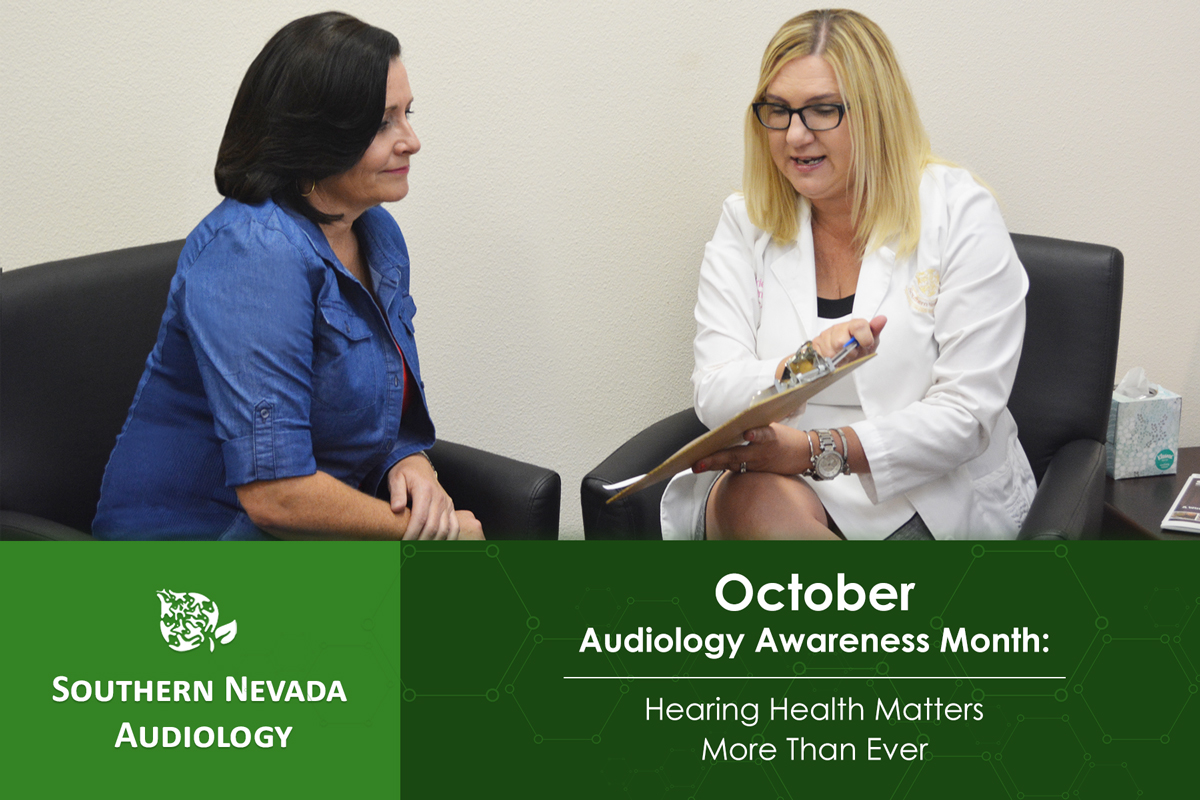October is Audiology Awareness Month, a time dedicated to raising awareness about the importance of hearing health. As audiologists in Las Vegas, we see firsthand how vital hearing is to your overall well-being. From daily conversations to enjoying music or alarms signaling safety, healthy hearing is an essential part of life. But many people overlook their hearing health until issues arise. Let’s break down the importance of prioritizing your hearing and how you can take proactive steps to protect it.
Why Should You Care About Hearing Health?
Hearing loss is more common than you might think. According to the World Health Organization, over 430 million people worldwide have disabling hearing loss. The scary part? Hearing damage is often irreversible, but it can be preventable with the right care.
- Early Detection Prevents Long-Term Damage
Hearing loss can be gradual, meaning you may not notice it until it significantly impacts your life. This is why regular check-ups are key. Early detection of hearing issues allows us to address potential problems before they worsen. Think of it like vision: You wouldn’t wait until you couldn’t see the board to get glasses, right?
- Hearing Affects Cognitive Health
Research shows that untreated hearing loss can lead to cognitive decline. When your brain is constantly trying to fill in the gaps from missed sounds, it works overtime, which can lead to mental fatigue. Over time, this strain may contribute to conditions like dementia. Taking care of your ears isn’t just about hearing — it’s about keeping your mind sharp too.
- The Impact of Untreated Hearing Loss on Relationships
Hearing loss can make everyday communication frustrating, leading to misunderstandings or withdrawal from social situations. This strain can affect relationships with family, friends, and coworkers. Addressing hearing loss early on can improve your quality of life and keep you connected to the people you care about.
When Should You Get Your Hearing Checked?
A good rule of thumb is to have your hearing checked at least once a year, especially if you:
- Have a family history of hearing loss
- Are regularly exposed to loud environments (e.g., concerts, machinery, or even loud music through headphones)
- Notice signs of hearing changes, such as ringing in your ears (tinnitus), difficulty hearing in noisy environments, or frequently asking people to repeat themselves
How You Can Protect Your Hearing
- Use Hearing Protection
If you’re frequently around loud noise, wearing earplugs or noise-canceling headphones can be a game-changer. Whether you’re at a concert, working in construction, or simply mowing the lawn, protecting your ears from loud sounds reduces the risk of noise-induced hearing loss.
- Take Listening Breaks
For those who use headphones often, especially at high volumes, it’s important to give your ears a rest. Follow the 60/60 rule: listen at 60% of the maximum volume for no more than 60 minutes at a time.
- Schedule Regular Hearing Screenings
Don’t wait until you notice a problem. A hearing check is quick and painless, and it gives you valuable information about your ear health. Even if your hearing is normal, keeping track of it over time helps establish a baseline.
Audiology: More Than Just Hearing Aids
As audiologists, we provide a wide range of services beyond prescribing hearing aids. We can help with tinnitus management, balance disorders, and custom hearing protection solutions. We work closely with patients to ensure their hearing needs are met in a way that complements their lifestyle.
The Bottom Line
This Audiology Awareness Month, take the opportunity to reflect on your hearing health. Whether you’ve never had a hearing check or are already using hearing aids, maintaining regular appointments with an audiologist is an essential step toward preserving your quality of life. Hearing loss is preventable and treatable — so let’s work together to keep your hearing healthy!
If you have concerns about your hearing or would like to schedule a hearing test, contact us today. Remember, protecting your ears now can make all the difference later.

